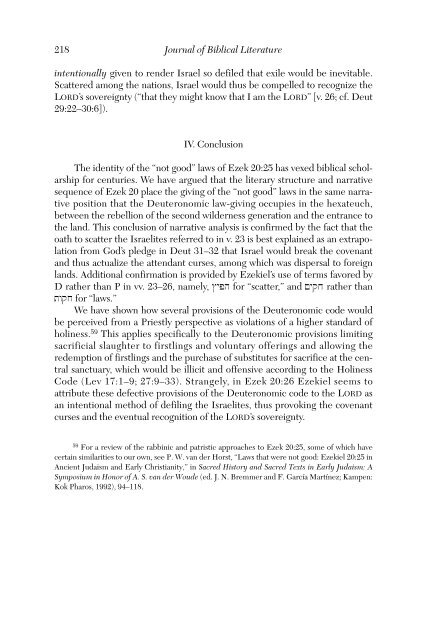Journal of Biblical Literature - Society of Biblical Literature
Journal of Biblical Literature - Society of Biblical Literature
Journal of Biblical Literature - Society of Biblical Literature
You also want an ePaper? Increase the reach of your titles
YUMPU automatically turns print PDFs into web optimized ePapers that Google loves.
218<br />
<strong>Journal</strong> <strong>of</strong> <strong>Biblical</strong> <strong>Literature</strong><br />
intentionally given to render Israel so defiled that exile would be inevitable.<br />
Scattered among the nations, Israel would thus be compelled to recognize the<br />
LORD’s sovereignty (“that they might know that I am the LORD” [v. 26; cf. Deut<br />
29:22–30:6]).<br />
IV. Conclusion<br />
The identity <strong>of</strong> the “not good” laws <strong>of</strong> Ezek 20:25 has vexed biblical scholarship<br />
for centuries. We have argued that the literary structure and narrative<br />
sequence <strong>of</strong> Ezek 20 place the giving <strong>of</strong> the “not good” laws in the same narrative<br />
position that the Deuteronomic law-giving occupies in the hexateuch,<br />
between the rebellion <strong>of</strong> the second wilderness generation and the entrance to<br />
the land. This conclusion <strong>of</strong> narrative analysis is confirmed by the fact that the<br />
oath to scatter the Israelites referred to in v. 23 is best explained as an extrapolation<br />
from God’s pledge in Deut 31–32 that Israel would break the covenant<br />
and thus actualize the attendant curses, among which was dispersal to foreign<br />
lands. Additional confirmation is provided by Ezekiel’s use <strong>of</strong> terms favored by<br />
D rather than P in vv. 23–26, namely, $yph for “scatter,” and !yqj rather than<br />
twqj for “laws.”<br />
We have shown how several provisions <strong>of</strong> the Deuteronomic code would<br />
be perceived from a Priestly perspective as violations <strong>of</strong> a higher standard <strong>of</strong><br />
holiness. 59 This applies specifically to the Deuteronomic provisions limiting<br />
sacrificial slaughter to firstlings and voluntary <strong>of</strong>ferings and allowing the<br />
redemption <strong>of</strong> firstlings and the purchase <strong>of</strong> substitutes for sacrifice at the central<br />
sanctuary, which would be illicit and <strong>of</strong>fensive according to the Holiness<br />
Code (Lev 17:1–9; 27:9–33). Strangely, in Ezek 20:26 Ezekiel seems to<br />
attribute these defective provisions <strong>of</strong> the Deuteronomic code to the LORD as<br />
an intentional method <strong>of</strong> defiling the Israelites, thus provoking the covenant<br />
curses and the eventual recognition <strong>of</strong> the LORD’s sovereignty.<br />
59 For a review <strong>of</strong> the rabbinic and patristic approaches to Ezek 20:25, some <strong>of</strong> which have<br />
certain similarities to our own, see P. W. van der Horst, “Laws that were not good: Ezekiel 20:25 in<br />
Ancient Judaism and Early Christianity,” in Sacred History and Sacred Texts in Early Judaism: A<br />
Symposium in Honor <strong>of</strong> A. S. van der Woude (ed. J. N. Bremmer and F. García Martínez; Kampen:<br />
Kok Pharos, 1992), 94–118.

















